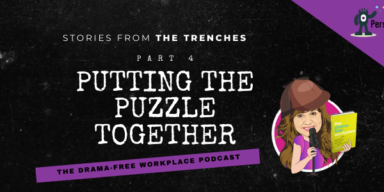Me jammin’ to Blu Cantrell: “Hey ladies, when your man wanna get buck wild, just go back and hit ’em up style…”
I was humming along at my top treadmill speed (it’s not fast, but let’s pretend it is!), listening to one my favorite workout songs (“Hit ‘Em Up Style” by Blu Cantrell) when the coach at my “structured group workout” gym tapped me on the shoulder to tell me that gym policy prohibited me for wearing headphones. She said she could provide me with ear plugs if the loud music bothered me.
“No thanks,” I said, “I only wear the headphones while I’m on the treadmill since listening to my own music makes this part of the workout bearable.” We all know that listening to great music makes for a much better workout, and research confirms that fact.
I asked her why I couldn’t wear them. “Because of safety,” she said. I asked what might be unsafe about running while listening to music and she said, “well, it’s also because this is meant to be a group class where everyone participates, and you should be able to hear me.” I pointed out that I only wore one headphone so that I could still hear her callouts and pointed out the lack of logic in wanting folks to listen and participate, but offering me ear plugs.
I should stop here to point out a few things.
First, you should know I am an unapologetic rule-follower. I’m the one who always gets an embarrassingly low score on those games that tally the number of times you’ve done something wild. And I’m okay with that. But even a self-professed goody-two-shoes like me needs to understand the why behind the what.
Second, I wasn’t mad at my coach. She was following instructions and relaying the rule – along with the silly justifications for that rule – as she’d been trained to do. But that reality prevented me from having the fantastic workout I’d hope to have.
Now back to my story.
My nice coach kept trying, offering to play any song I requested. I pointed out that while that was kind of her, it would mean I would recognize exactly one song of an hour-long playlist (I also pointed out that I was doing this in an attempt to be unselfish…I understand that my taste in music, especially workout music, is unique and influenced by my age and background, which is quite different from my fellow members).
I fully get that my story is a tale of a minor inconvenience. But it got me thinking of the number of times we are expected to adapt to rules that don’t actually solve a problem or address a real concern.
This has become commonplace at work and it’s why I dedicate an entire chapter to the topic in my book, The Drama-Free Workplace. I focus on the fact that too many rules are attorney-created legal commands, disseminated with little thought and no “why” for the rule. At their core, too many workplace policies seek to take away employee freedom (policies should set expectations, not restrict adults from being adults). Too many of them are punitive in nature, often meant to address one-off behavior. And don’t get me started on policies that are selectively enforced (a major root cause of #MeToo and other movements is the perception of unfairness because rules seem to only apply to some).
Policies should be a set of well thought-out rules that are written in plain English and that send the message that the organization is concerned about a healthy culture, rather than a series of legal CYAs. And they should also take humanity and compassion into account (yes, I really am an attorney and I really did just use “humanity” and “compassion” in this sentence).
My guess is that in my gym’s case, a corporate attorney decided to add this rule, perhaps because one person made a claim. No matter the reason, this corporate policy has resulted in blameless employees and managers having to contort themselves into pretzels to justify the policy (one said to me that if they allowed me to wear headphones, suddenly everyone in the class would not only be wearing them but would also “start conducting business on their phones instead of working out,” what?).
So what now?
If you’re on board with the concept of having your company policies reflect core values rather than legal fears, you might be wondering what that might look like. Here are a few examples of typical policy language on various workplace issues, with contrasting language that addresses the “why” behind the policy. Feel free to cut-and-paste to your heart’s desire.
As long as organizational leaders continue to write, disseminate and (sometimes) enforce policies that employees find distasteful at best and infuriating at worst, we will continue the cycle of “us versus them.”
Together, let’s change the narrative to make policies one piece of the larger puzzle in our quest to create and sustain healthy, inclusive, productive and fun – yes fun! – workplace (and gym) cultures.

About PersuasionPoint
Patti Perez is founder and CEO of PersuasionPoint, a modern-day consulting firm dedicated to teaching leaders and teams how to create and sustain healthy, equitable and inclusive workplace cultures. Patti is the best-selling, award-winning author of The Drama-Free Workplace (Wiley 2019), and draws from the book’s themes to provide practical, authentic, and action-oriented solutions to help companies achieve true diversity and equity, and to create environments of belonging and inclusion.
Patti and the team provide services specifically tailored to address workplace struggles with recruiting, retaining, promoting and fully valuing diverse employees – including consulting, leadership training, and boot camps for diverse attorneys who are emerging leaders.
Contact Patti here or email her directly at Patti@PersuasionPoint.com.
















